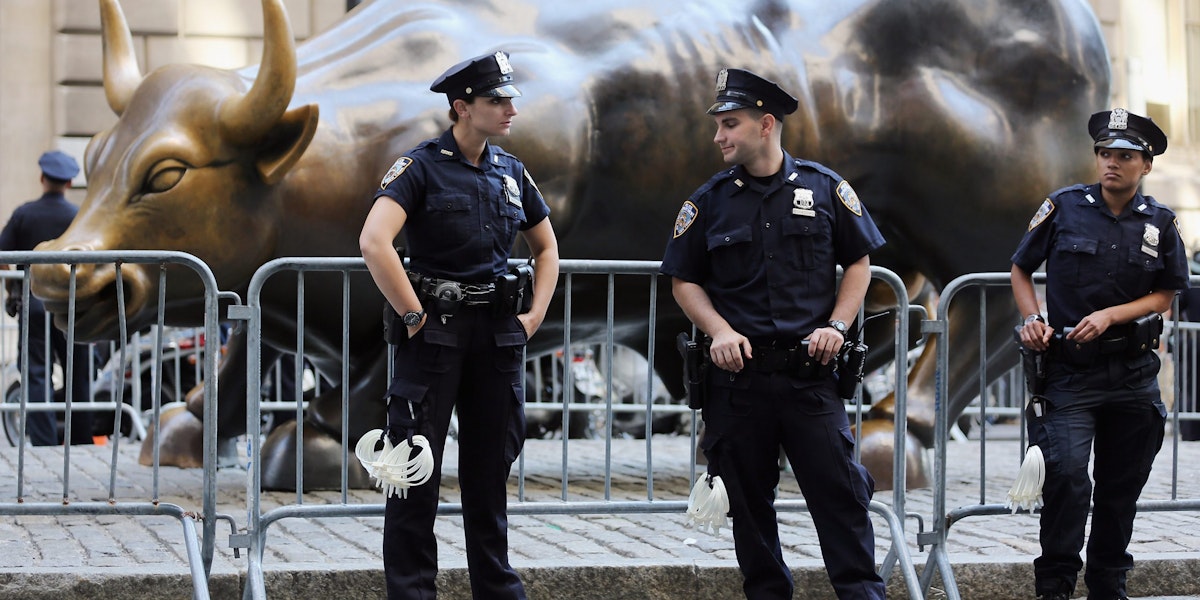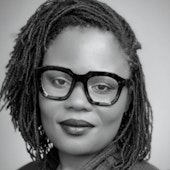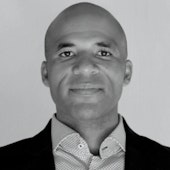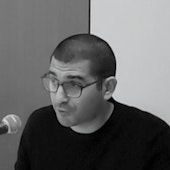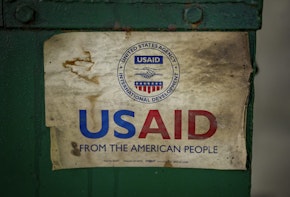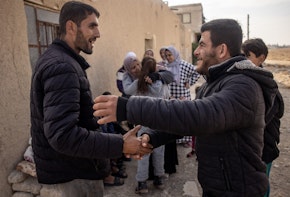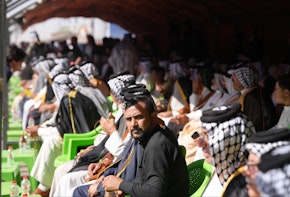For the last decade and more, popular outrage at police brutality has driven mass protests in both the Middle East and the West. Opposition to police excesses—from police beating men and women in the streets of Cairo in 2011, to corruption and repression in Iraq, to the murder of George Floyd in Minneapolis in 2020—has pushed discussions about police reform into the mainstream.
Most of the time, discussion of policing and of popular concerns takes place in an exclusively national context, with very little effort to compare cases in different countries, or to look at the impact of international dynamics and training on law enforcement.
In some communities, policymakers and reformers have contemplated major overhauls of police departments, or shifts in funding from law enforcement and toward prevention. Some critics have gone even further, calling for defunding or even abolishing the police and investing in communities instead. The reform debate often unfolds in a highly polarized political context, with little overlap between securitized “law-and-order” constituencies, incremental reformers, or those who propose more radical solutions.
Most policymaker responses to police abuses focus on reform. The thinking goes that police behave badly because of issues like poor training, weak relationships with communities, inadequate diversity, a lack of professionalism, and cultural factors. Attack these deficits in police forces, reformists argue, and the police will perform their true function: to serve and protect.
Some who study policing argue that reform efforts can backfire, empowering police in the wrong ways—entrenching rather than fixing problems of police violence, corruption, repression, and authoritarian behavior.
Century International convened eight experts on policing who have conducted fieldwork, surveys, and research in the United States, Canada, Turkey, and Iraq. In meetings spanning several months, they explored the impact of experiments with police reform—what its effects are on police and on police–citizen relations. Despite vast differences in policing contexts, contributors found that there are meaningful connections to be made.
One popular template for reform in a broad range of countries is “community policing,” whose basic premise is that greater interaction between police and the community will lead to more democratic policing. Around the world, community policing has a friendly image: approachable officers, and meetings where the public can weigh in. But, as some of the roundtable participants point out, its actual effect in many cases is to incorporate greater numbers of ordinary people into policing networks. Ordinary citizens are effectively deputized as information-gatherers for the police; care work and social services become tied to cooperation with the police; and the policing of marginalized groups is intensified. All of this is hardly a recipe for the democratization of the police. In fact, it might better be described as the securitization of everyday life.
Comparing reform efforts across regions and countries, the discussion reveals the extent to which police reform has become a global industry, consisting of international police exchanges and training, institutional and funding infrastructures, and actors ranging from security experts to human rights workers. Yet, as the roundtable participants point out, the ambiguous record of reform on policing abuses—and even more fundamentally, on governance—makes it essential to explore alternatives to current approaches to police reform.
If the point of police reform is to place limits on the potential for bad behavior by police, one useful framework for assessing police reform starts by asking how reforms limit or entrench police power. Roundtable contributors sought to develop analytical tools to productively frame responses to such questions.
The discussions in this roundtable represent the views of the participants and do not necessarily reflect the positions of The Century Foundation.
Changing Police Cultures
Mara Revkin: Apart from training, which has its limits, I think change can be achieved through recruiting different types of people to become police officers. The research on women’s integration into police and militaries generally finds that increasing the number of women in a unit can improve outcomes, including decreasing sexism and sexual harassment. Gender integration also has benefits for communities because women often feel more comfortable reporting crimes and problems to female police officers than to male police officers, particularly in cases of gender-based violence.
But you really need to achieve a meaningful threshold of women’s inclusion. In Iraq, only 2 percent of police officers are women. That’s not a sufficient threshold. Female Iraqi police officers are often the only women in their unit, so they feel tokenized. Even when they are present in meetings, they don’t feel that they can meaningfully influence decisions. Improving the diversity of police in terms of gender, race, or any other attribute has to go beyond token quotas to create an environment in which underrepresented groups can actually thrive—otherwise, they will be marginalized within security institutions.
Monica Bell: Yes, absolutely. Structural change is key even to approaches that don’t change deep culture but might make some positive impacts on marginalized people’s lives.
Alex Vitale: There’s a lot of research in the U.S. context that shows that culture changes in the police are not possible because of the institutional pressures that shape the job. The research shows that when you take a group of people, and you send them to pursue vulnerable and marginalized populations, where there’s resentment and resistance to what they’re doing, it’s going to create a culture of defensiveness, authoritarianism, and racism.
One of the main problems I have with the professionalization language is that it imagines that the police are somehow not doing what the existing political power structures want them to do. But the fact is that the police are doing exactly what the political power structures want them to do. Training, under those circumstances, is just legitimacy-seeking.
“The fact is that the police are doing exactly what the political power structures want them to do.”
Internationally, is it possible to have sustained political transformation that reduces the level of, say, gross corruption, extrajudicial killings, and death squads? I imagine it’s possible, along with broader political transformation, but even then, policing will always be a repository of very conservative authoritarian tendencies, because that is the nature of the job.
Nicole Nguyen: I would extend Alex’s comment, to argue that changes in policing culture don’t just reinforce the role of the police—they can also work to expand their legitimacy and power, as with Police Activities/Athletics Leagues in the United States, which build police–youth relationships through sports programming. It’s important to consider how these cultural shifts correspond to community policing efforts that intend to enhance police power, rather than decrease racial profiling, limit the use of force, and respond to community concerns. Do these new measures rein in police power, or expand it?
Monica: If we’re talking about certain aspects of policing that are dictated by the types of authority they have in particular places, then yes, those are not changeable. But I also think we need to calibrate what we mean by culture. For example, in the United States, the current leading cause of death among police officers is COVID-19, because there’s vaccine resistance. So, some aspects of culture are fundamental to the policing project, while others are more superficial and are changeable.
In the United States in particular, police departments largely emerged to carry out economic and racial oppression. So, it’s hard to think about changing those aspects of culture. I’ve interviewed people in Black communities who say they’ve seen cultural changes in policing in their communities over their lifetime, but not in ways that make the police not racially oppressive. When we talk about the culture of policing, we need to have some nuance and specificity about what we mean by culture—and what we think is actually changeable short of an abolitionist framework.
Alex: There’s a lot of research that shows that marginal increases in the number of female officers produce marginal reductions in use of force and improvements in satisfaction. But what if we really had a police department that was 60 percent women, would that police department be carrying out its mission? There would be tremendous pressure to get women officers to behave like male officers so that street corners and homeless encampments and so on would be cleared fast enough.
To me this is the larger truth about culture: that culture is an adaptation to a set of concrete social pressures, it’s about relationships to the material world and power. We live in racist, misogynistic societies, and we think that somehow we’re going to reduce those problems by starting with diversifying policing. These are broad societal problems. Policing reflects those problems and is kind of the worst offender in some ways. Let’s focus on how we really make these broader changes in society and quit wasting valuable resources thinking we’re going to change them through police training programs or diversified hiring.
The Rise of Community Policing
Mara: In 2019, I worked with the International Organization for Migration in Iraq to evaluate a community policing program that they have been implementing in partnership with Iraq’s Ministry of Interior. The program includes training of community police officers in human rights, rule of law, and gender sensitivity, as well as monthly dialogue meetings between community police and civilians. Community police officers work in their home communities and therefore tend to be representative of the ethnic and religious composition of the local population. The program also trains female community police officers in an effort to increase the representation of women in state security institutions.
The research included a comparison of baseline and end-line surveys in three communities where the program was implemented over a six-month period in 2019. The data we gleaned provide some helpful snapshots of attitudes toward the police. We found that respondents had more favorable views of community police than federal security forces. These findings were surely influenced by what was happening in Iraq at the time. In between the baseline and end-line surveys in July and December 2019, Iraq experienced a powerful wave of peaceful anti-government protests. Iraqi federal riot police, SWAT forces, and government-allied militias responded with lethal force, killing more than six hundred people. Importantly, community police did not participate in the repression and actually intervened at times to protect civilians and affirm their rights to freedom of speech and protest.
“Community policing methods should really be mainstreamed throughout the entire state security apparatus in order to be effective.”
Community policing methods should really be mainstreamed throughout the entire state security apparatus in order to be effective. If community policing is only implemented in one branch of a multifaceted security apparatus, there is a risk that state security forces will use community policing programs to claim legitimacy, while other security forces continue to engage in repression or other abuses of power.
Hayal Akarsu: During my research into police reform in Turkey, there was violent police repression of protests. In 2013, police responded violently to protests opposing the demolition of Gezi Park, in Istanbul, killing or injuring several people. At the same time, the Turkish police were implementing a huge EU project on preventing disproportionate use of force. I took this paradox as a question to explore in my research focusing on what kind of social impact police reforms had on both the police and the public, more broadly: What do police do with reform and what does reform do to police and policing if not prevent violence? Ultimately, police reforms work. They’re successful—but not in terms of their stated aims. Reforms are successful for the police. My police interlocutors used these principles of proportionality and gradual application of force to document in their reports that citizens put up resistance; thus, the force exerted by the police became “proportionate” force. In other words, rather than reducing police violence, the effect of these reforms has been to provide the police with new legal tools and documenting practices to justify their use of force.
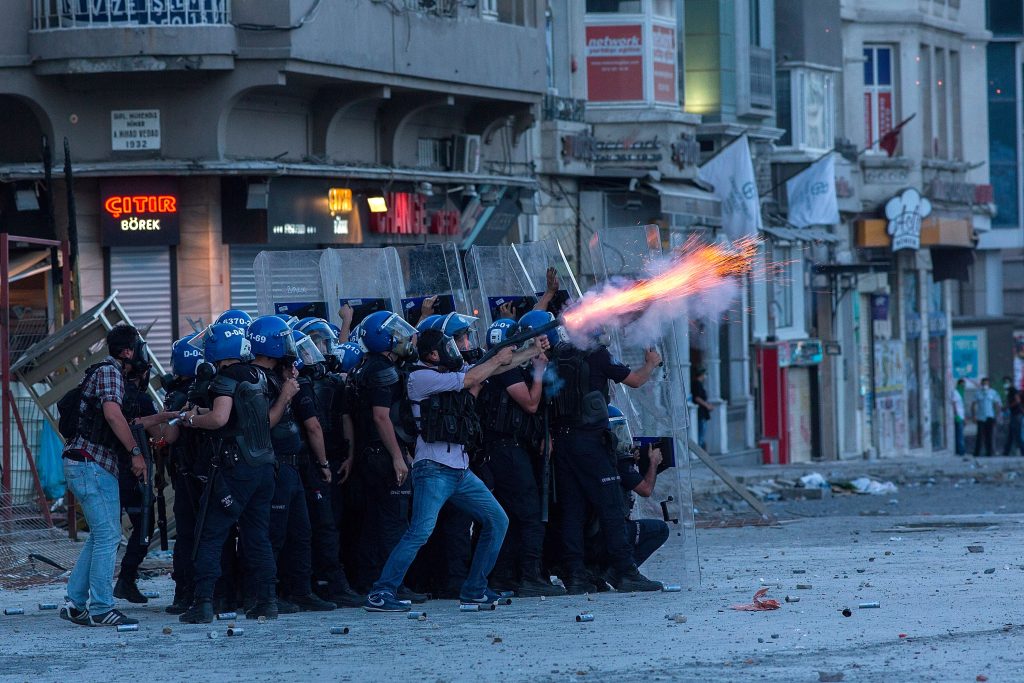
Joanna Gilmore: We can also see how police reform in the British context ends up underwriting police violence. What Mara described resonates. In the last ten years, in very different circumstances, there has been a big crisis of legitimacy for the police. Then, there has been this development of “community policing”—or “dialogue policing,” as they call it in the UK now—which has been the response to that crisis of legitimacy.
Mara, I’m curious about the intelligence-gathering function that the police in Iraq have provided. Where community policing has been used in various contexts in the UK, the police involved often have backgrounds in intelligence gathering roles. The police have gathered a lot of significant information under the guise of dialogue relationship–building. It was remarkable to see that photograph you showed of community officers handing out bottles of water at the protests—I have a really similar one in Greater Manchester, where we have this bizarre scene of riot police on one side and blue-bibbed police officers handing out bottles of water to protesters, on the other. Community policing is not just about building relationships and a softer side of policing. The information gathered by those police officers actually feeds into and helps legitimize and intensify more coercive forms of policing.
Increasing Trust and Legitimacy
Mara: One of the interesting things about the community policing model is that the same program can be framed in many different ways, to serve very different purposes. These purposes can include being a mechanism for increasing security forces’ respect for human rights, improving the quality of governance and services (by receiving citizens’ complaints), or promoting national security through intelligence-gathering (by encouraging citizens to share information with police). In the Iraqi context, police have been actively involved in counterterrorism operations both by receiving tips from informants and arresting suspected Islamic State insurgents. The federal police have participated directly in the military operations to defeat the Islamic State. Although community police are unarmed and they are generally represented as protectors of citizens rather than protectors of the state in Iraq and other contexts, community police are natural tools for counterterrorism: they increase citizens’ trust in state security forces and generally make them more willing to share information about potential security threats.
Nicole: As Joanna has alluded to, authorities have historically turned to community policing to address coercive, rogue, or otherwise unjust policing efforts to enhance community–police relations and increase police legitimacy. In my view, this hasn’t had much success. In the United States, after the 1992 Los Angeles uprisings, the Department of Justice’s Operation Weed and Seed initiative encouraged communities to collaborate with local police to gain access to community revitalization resources. These programs appeared to enhance social services in poor and working-class communities of color, while effectively expanding police power.
The United States has applied community policing models like Weed and Seed to the domestic War on Terror, using new security regimes that assume Muslim, immigrant, and other diasporic communities are uniquely vulnerable to radicalization and extremism. In Hillary Clinton’s words, countering violent extremism (CVE) would enlist community members and social service providers as the “eyes and ears” on the front lines of the domestic war on terror.
This means the state is reinvesting in disadvantaged communities by transforming public provision of social supports into a Global War on Terror weapon. Vying for resources, police departments, social service providers, and community leaders have integrated this federal anti-terrorism model into local and national security initiatives as well as caregiving practices. This model typically casts suspicion on everyday behaviors and religious practices.
For example, training materials encourage police officers and community members to interpret common immigrant experiences in the United States—such as homesickness, stress, and disenfranchisement—as signs of potential terrorist radicalization. Empowering community policing in this way can intensify racialized policing and expand police powers by further reaching into intimate spaces of daily life, from school lunchrooms to therapists’ offices.
Learn More About Century International
A Global Industry
Hayal: As we know, police reform is a global industry. Community policing—with its basic idea of bringing community and police together to make policing more democratic—is often a popular template provided to countries like Turkey, where police assume more innocuous or nonviolent roles in local communities. In my ethnographic research of Turkish police reform, I followed one cohort of police academy graduates during eighteen months from 2015 to 2017. I trained with them, taking all their courses at the police academy, from legal issues to how to use a police baton and gradually increase the use of force.
There are several similarities with the cases of the United States and Iraq that Nicole and Mara described. Community police also have different uniforms and usually do not carry guns, they play with kids, they distribute brochures, they hang out with people—in Turkey, they play backgammon with local shop owners. As I observed in my research, all these socializing activities incorporate ordinary people more into the networks of policing. This has the effect of broadening the spectrum of criminality—ordinary behaviors that would normally not be considered criminal are reported. Another key similarity that comes to mind is the expansion of the social reach of the police through care work, which is a big focus of these community policing and reform projects. For instance, as part of my fieldwork, I accompanied police while they were doing house visits to more than sixty households distributing social benefits.
“We often focus on spectacular moments of police violence, but it is the infusion of policing in the different realms of everyday life that should also be a focus in the study of policing.”
We often focus on spectacular moments of police violence, but it is the infusion of policing in the different realms of everyday life that should also be a focus in the study of policing. The securitization of everyday social life brought about by these projects can be seen in how they turn ordinary people into the agents of policing. For example, when law-abiding citizens are engaged in community policing meetings, these citizens use the meetings as an opportunity to ask for more policing of “suspect others”—in the case of Turkey, usually Syrian refugees and Kurds. As the United States also shows, when you ask law-abiding citizens to participate in policing, they can easily become law-enforcing subjects. There is a broad spectrum of people participating in policing, and sometimes communities are complicit in many policing projects, raising important questions.
Omar Sirri: Picking up on Hayal’s point about people’s complex relationship to policing: in my work, I look at security checkpoints in Baghdad set up shortly after the 2003 U.S.- and UK-led invasion of Iraq. Through punctuated moments of violence after the invasion, what were initially U.S. occupation checkpoints subsequently became normalized with the participation of Iraqi security forces, and ultimately came to organize security efforts in the city.
For years, checkpoints in Baghdad have dotted the city’s streetscapes, along main thoroughfares and at entrances into neighborhoods. They are ostensibly meant to engender security and guard against spectacular acts of violence, and yet these checkpoints have been ineffective at establishing security. Popular complaints about checkpoints get particularly acute when massive security breaches occur. The question I consider in my work is, if these checkpoints are not bringing security, what do they do? What are their effects?
I suggest that apart from policing the marginalized, the main function of checkpoints is to reify state power, even when they are mocked as useless. One recurring criticism among residents is, “There is not one time a checkpoint has caught a car bomb.” But while bemoaning these security installations, residents often also express a desire for more effective security infrastructure. That is, it is not so much people demanding the wholesale removal of security efforts that so many believe amount to nothing, but rather their replacement with something that actually brings about the provision of everyday security.
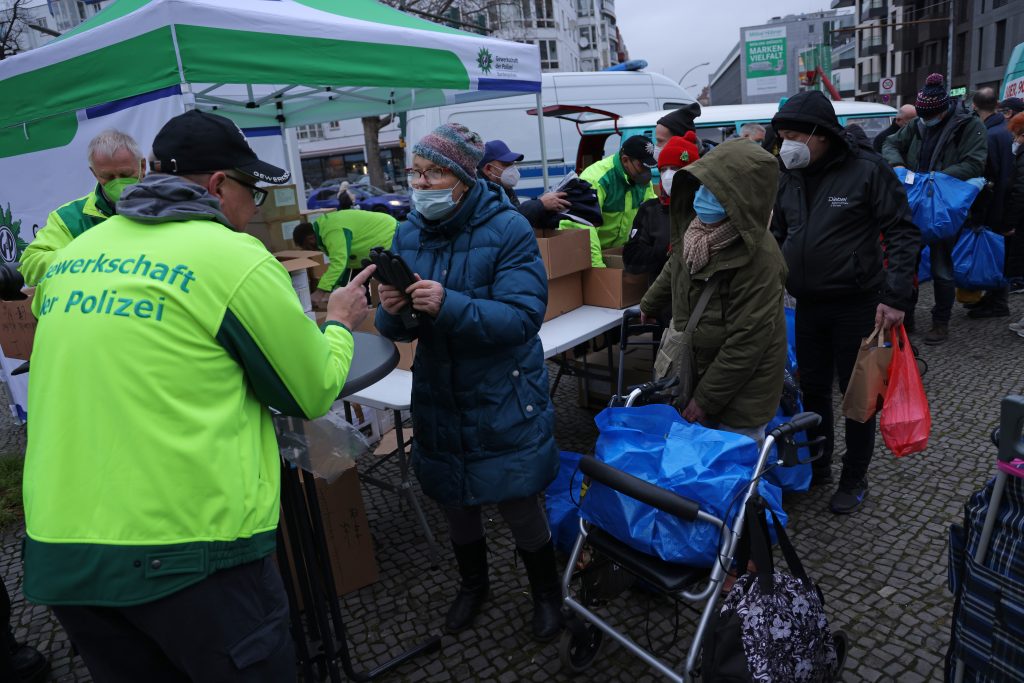
Mara: Community policing has become a very popular model for police reform, and it is based on the assumption that more contact between the police and communities is a good thing, and that policing is a public good that communities want. However, that assumption is really problematic in contexts like the United States and in places like Iraq, where police have long histories of repressing marginalized groups, soliciting and accepting bribes, and other abuses of power. It’s not clear that more contact will necessarily improve citizen–police relations, even if it is positive contact with unarmed community police who are well-liked and well-trained—because mutual distrust and animosity run so deep.
Learn More About Century International
Transnational Connections
Hayal: As part of my research following one cohort of police academy trainees, I attended several trainings in Ankara involving international experts and security bureaucrats. For example, there was a training by U.S. Drug Enforcement Administration officers about their operations at the Mexican border, given to Turkish police and police from Afghanistan, Somalia, and so on. There was another training given by Frontex (the European Border and Coast Guard Agency) to Turkish police officers.
When we think of police forces we tend to think of them as operating within their national borders, but there are many international connections. Police reform is a global industry, with a political economy behind it and sets of expertise. And because of the recent transformations in the Middle East, Turkey has been exporting military and security technologies along with police reform know-how in the region. Turkey has embraced EU reforms both to strengthen the state and to claim a role as an exporter of police training in the region.
Typically, when thinking about Turkey’s political trajectory, there is a contrast made between the democratization period of the early years of this century and the increasingly authoritarian populist era after 2010. But what I found in my research was that the police reforms that were implemented as part of Turkey’s EU accession talks were actually critical to the government’s populist turn.
Police reform came to Turkey through the EU accession talks, but also in relation to the UN and the International Monetary Fund. Police reforms were not only about the police. They were also part of broader processes of developmentalism, reforming the whole governmental apparatus. In non-Western contexts, what we call “reform” is a part of these broader processes of developmentalism, humanitarianism, and modernization, and so it is always entangled with transnational organizations.
Because of this global template or framework of community policing, I think there is lots of room, both politically and scholarly, to discuss the broader implications of community policing. We should not only focus on one context, nor should we only distinguish between the “democratic” and the “authoritarian.” When the type of community policing projects I researched do not work, observers tend to say, “Oh, it’s because Turkey is authoritarian.” No, it is because community policing and its liberal assumptions are problematic. That’s why it’s really important to show these kinds of similarities between the Global North and South.
Alex: I think the functional similarities of reform across these contexts are incredibly in sync. And of course, they didn’t arise in isolation. There are three fundamental assumptions to community policing and, by extension, procedural justice, which is what I think this whole thing is rooted in, that are deeply problematic.
“If the water doesn’t flow, if there’s no power, if the transport infrastructure has collapsed, if there’s food insecurity—police are not the solution to any of that.”
One is the equating of police with security. If the water doesn’t flow, if there’s no power, if the transport infrastructure has collapsed, if there’s food insecurity, police are not the solution to any of that—those are core state and communal responsibilities. But community policing can entangle the police with the provision of social services, leading to other problems. In South Africa, for example, where policing infrastructure is mobilized to make people pay their water bills, you essentially have water police. What the Iraqi community police are doing doesn’t even sound like policing—it’s basic community service provision, a kind of front face of the state. Why on earth would the police need to be performing this role?
The second assumption is that police legitimacy is inherently a good thing. What we fail to take into consideration is the articulation between police legitimacy and state legitimacy. If police are enacting the power of an illegitimate state, then there’s an issue with police legitimacy. And the third assumption is that what police produce is automatically broadly beneficial for everyone when they do it in a proper way. Here, the assumption is that police produce a social good for everyone and that the legal regimes and order that they’re enforcing are good things. But the legal regimes and the notions of order that they are enforcing do not benefit everyone equally, and they do not automatically create broad prosperity or security for everyone. In fact, they have been fundamental tools for manufacturing exactly these inequalities of access to security and stability.
I think we have to ask a much more fundamental question about the legitimacy of the Iraqi state. The state has failed to provide basic human needs for people, and has implemented a kind of glad-handing policing as a way of saying that the problems of the Iraqi state are problems that can be solved by police with more public legitimacy. This is deeply problematic and is really no different than the failures of community policing in the South Bronx or Compton or wherever.
Monica: It’s really important to think about the commonalities in policing, and especially this global diffusion of certain policing models. I’m also wondering, though, how we think about the particularities of policing in different contexts. And I don’t mean we should just dismiss the policing problems of certain contexts as being the fault of “authoritarian regimes.” We also need to consider places like the United States, which overall is not an authoritarian regime but, for some people in certain contexts, functions as one. Particular themes suggest themselves when I think about the commonalities of the problems with community policing. When you think in terms of functional analysis, in contexts where police are dealing with marginalized populations—or just populations with a higher level of distress, like the Sunnis in Baghdad—police are playing a particular sort of authoritarian function. Getting deeper into the particularities of different contexts allows us to properly and precisely identify the commonalities that we should be focused on.
Citizenship, Policing, and Reform
Hayal: The securitization of everyday life associated with community policing projects means that some citizens become agents of policing, while others are subjected to intensified policing. There is a broad spectrum of people who participate in policing when called on to do so. It’s important to attend to what kinds of “othering” processes these reform projects are generating. It’s not a fixed othering. In most of the neighborhoods where I did my research, ethnic Turks participated in more policing of Kurdish residents, but in one neighborhood it was Kurdish residents who participated in more policing of Syrian refugees.
Nicole: Part of counterterrorism in the United States and elsewhere reformulates citizenship, such that the “good citizen” is the one who takes on policing functions. The security state often promotes the integration of community members into policing institutions as the democratization of police power and, by increasing the role of women and people of color, a kind of gender justice and racial justice. Community policing reforms can deputize community members as police officers, enhancing police powers while at the same time claiming to promote racial justice. Yet, when we look through a racial lens, we see that this is more complicated for Muslim communities: any Muslim who refuses to participate in such policing practices is seen as suspicious. In this racial context, the good citizen or bad citizen is prefigured as the good Muslim or bad Muslim.
“Community policing reforms can deputize community members as police officers, enhancing police powers while at the same time claiming to promote racial justice.”
Tethering policing to social services is one way that you redefine “good citizenship.” By invoking the good Muslim/bad Muslim trope, many of these national security initiatives have fomented suspicion and fractured Muslim communities, particularly by dividing those who have participated in community policing practices and those who have criticized the tying of social services to policing institutions.
Alex: Community policing is fundamentally about broadening the logics of policing and the inclusion of the population in intelligence gathering. But I also want to raise the issue of the expansion of the social work function under the direct supervision of policing as a reform, so that as police kill people with disabilities or who are having a mental health crisis, the solution has been to first give police more training and, second, to hire social workers to work with the police. Now, in every precinct in New York City, there is a social worker assigned to the intake process to help address the consequences of them having been criminalized in the first place.
Of course, this creates an adversarial relationship between the social worker and lots of people in communities where their citizenship status is suspect—not just in the technical sense of country of origin, but also, folks who are unhoused, youth who are not considered adults. All these folks are now told that the way you can get help is through the criminal legal system, which many of them don’t want to have anything to do with. The integration of social work into policing further excludes these people from the right to assistance and full citizenship.
There’s also a bunch of books in the labor arena about how citizenship status is used to divide workforces in industrial settings. What looms behind this use of citizenship status in the United States is the constant threat that someone will call Immigrations and Customs Enforcement. And of course, the employer is almost never penalized, only the employees. One way to think about this type of policing is as a labor control strategy and also a political demobilization strategy. Race and immigration status have been used to divide labor. This kind of division has also been used for colonial projects.
Nicole: These community policing practices actually pivot on citizens having been excluded from citizenship. In my research, there were a lot of Muslim and Arab people willing to participate in community–police relations as a way to gain inclusion into the political body and because they wanted to have a say in national security, and the only way to have a say is to actually participate in the various systems that criminalize them. You have a kind of conditional inclusion.
Alex: One motivation that some in these communities might have for choosing this conditional inclusion is that their experience of everyday policing is a clear message that they don’t belong. Didier Fassin’s work in the suburbs of Paris makes clear that the policing there is motivated by a very clear analysis that you don’t belong. And people who are trying to struggle for inclusion will attempt to engage the police to convince them, “No, no, we’re okay.”
Omar: And if you don’t participate in these sorts of policing regimes, you become suspect. For instance, Canada’s intelligence agency, the Canadian Security Intelligence Service (CSIS), has been known to contact Muslim students at Canadian universities as a means of investigating “threats to national security.” Of course, rejecting these securitized overtures—refusing to meet with CSIS agents—can immediately place a young student on the wrong side of these security institutions. They are thus placed under suspicion simply for exercising their rights to not speak with Canadian intelligence. CSIS agents sometimes suggest their efforts are to protect the safety of the students. Muslim lawyers and academics disagree, and set up a hotline for students who have been contacted by CSIS to receive pro bono legal support.
It’s important that we are meeting two decades after 9/11; the twenty years of context matters. Practices and regimes of discrimination within policing institutions need to be identified as such, in part because they extend across a host of institutions and practices that do not necessarily look like “the police.” Again in Canada, the Institute of Islamic Studies at the University of Toronto has been expansively examining forms of Islamophobia that have conditioned a host of policing and bureaucratic practices. One project explored the ways the Canada Revenue Agency, under the auspices of “anti-terrorism” policies, disproportionately audits Muslim charities in Canada and strips them of their charitable status. This 2021 report shows the way Canada’s tax agency has developed and implemented practices that are part and parcel of discriminatory policing—even if in different form.
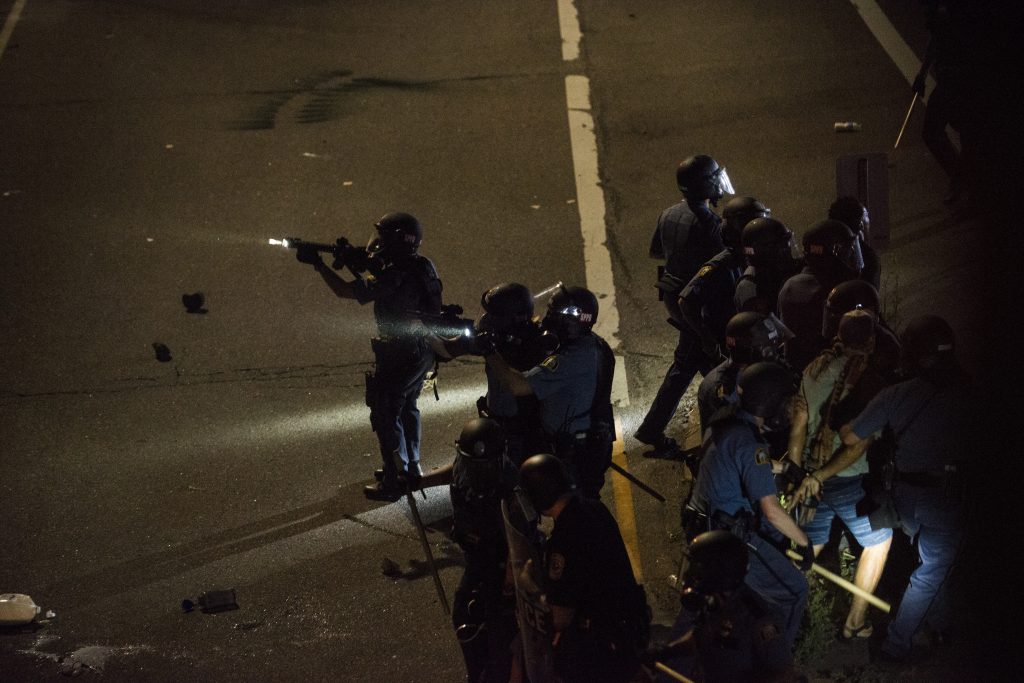
Nicole: Also, post-January 6, there’s a push in the United States to say that police target white supremacists. There was a Boogaloo Bois sting operation, in which undercover FBI agents incited members to send weapons to Hamas. Even in the policing of white supremacy, it has to be a racialized project, it has to involve Hamas; it can’t just be the Boogaloo Bois raising money for themselves and sending each other weapons. I think part of the citizenship analysis is important in terms of guarding against liberal reforms to policing, because all of these reforms just expand police power to target communities of color and other minoritized communities.
Omar: Nicole, is the point that the legal apparatuses are inherently racialized or Muslimized that way? Are these apparatuses actually built to target Muslim “terrorists,” so their use or deployment has to be done in such a manner that strange, racist connections are made between very different kinds of groups? Are such practices structured into the policies and laws, or are you suggesting something else is going on?
Nicole: There are plenty of laws on the books if we wanted to go after white supremacists as white supremacists. We don’t actually need more legislation to criminalize white supremacists. We have enough laws. Anti-Muslim racism is baked into the criminal-legal system, and also the courts—specifically, those that are adjudicating these cases. Every single person detained at Guantanamo is Muslim. That isn’t a coincidence. That’s by design, with anti-Muslim racism organizing the torture memos and other legislation authorizing indefinite detention and torture at Guantanamo and CIA black sites.
Essentially, the United States is saying, “Look, we’re expanding police powers to target white supremacy.” Invariably, though, communities of color experience blowback from this expansion. The police are trying to gain legitimacy by saying, “We get that there are white supremacist elements within us, but we see white supremacy as a problem and we’re going to criminalize it.” In other words, the problem of white supremacy is cast as an aberration—a few bad apples—rather than as a structural issue built into the institutions and processes of U.S. governance, including policing.
So using Hamas to get the Boogaloo Bois is more about Hamas than it is about Boogaloo Bois—it’s really reaffirming Hamas as a terrorist organization, rather than Boogaloo Bois as a security threat.
Placing Limits on Policing
Akwasi Owusu-Bempah: A central question that we need to ask is about the basic role and function of the state in relation to society. I think that question is one that needs to be continually asked—and that can be asked across geopolitical context—so that we can inform what it is that we want policing to be, whether or not that’s what ends up happening in terms of what policing is.
Monica: There might be some basic police function of preserving the status quo and doing the work of the state, but what the actual work looks like on the ground differs across context. I think it would be really interesting to focus both on the same universal functions and also, therefore, the particular contextual differences, as a way of thinking about comparison.
“To what extent should we be considering how policing is but one public good among many?”
Omar: Policing and the provision of security is of course just one of many ostensibly public goods. So what does it mean to have a single provider of public goods? That is, to what extent should we be considering how policing is but one public good among many, others that include not coercion, but other kinds of “positive” everyday services like water and electricity? How should we be thinking about the differences between these goods and services?
Nicole: And also, are any of those other service provisions disentangled from police and security? Social work in the United States is not disentangled from the police. If you have a security state, can it provide services beyond its securitizing functions?
To go back to the Baghdad example of people being critical of checkpoints and also wanting the checkpoints: where does this desire for the police and state security practices come from—across different kinds of contexts? For me, that’s the more granular part. The multi-scalar analysis across contexts raises questions such as: What is the role of the state? How does the state reinforce the social order? How do people come to participate in reinforcing that social order and the state’s violence?
Mara: Something I’ve observed in Iraq is that even where the police are not particularly popular and there may be various grievances against them, other nonstate providers of security are also unpopular, and maybe even more so. People still want state policing. The police do not have a particularly good reputation in a lot of communities, but I think they are perceived as an important counterweight against other nonstate actors who may be even more problematic, such as militias.
Akwasi: I am thinking about the comments around colonialism, capitalism, globalization, the interplay between policing and military, and how they are all part and parcel of the same system, and how there’s more of some and less of the other depending on the jurisdiction and instability, and a range of other factors. You might see more of an internal military presence than policing presence in certain jurisdictions, although of course militarization has crept into domestic policing in a lot of places in a large way.
Omar: One big piece to this question around limits on policing is the existence or presence of alternative institutions that have been built and are seen as alternative modes of security, broadly defined. And it may be that when there is a critical mass of folks building alternative practices and institutions that the debate becomes more resonant—or can resonate differently—in other places, such as in the Middle East. Perhaps when the opportunities to build alternative practices and institutions are absent or being actively stifled, the question is more a moot one. Though such conditions may be precisely where the debate should resonate more.
Alex: There’s not some magical switch where a society experiencing all kinds of insecurities—whether it’s neighborhood street killings or sectarian violence—would just turn off all police and then figure something out. Unfortunately, that’s the first impulse that people have when they hear the term abolition, and so they’re like, “We have profound insecurity and maybe you have some hypothetical long-term vision, but we have insecurity right now.”
Once the problem is framed that way, it’s a loser. Instead, I tend to think about it like this: we have decisions to make right now about the political and security realities, and we’re asked constantly to accede to interventions that reproduce and reinforce things like colonialism, authoritarianism, and a culture of violence and revenge. So how can we refine how we respond to each of these very specific real-world decisions? We don’t have to pursue a plan of tomorrow-there’s-no-police to retain the ability to call out reforms that are superficial or actually strengthen authoritarian power. And then, on the positive side, we look constantly for ways to push the needle on nonauthoritarian, non-repressive, non-racist solutions to our problems.
This report is part of “Transnational Trends in Citizenship: Authoritarianism and the Emerging Global Culture of Resistance,” a TCF project supported by the Carnegie Corporation of New York and the Open Society Foundations.
